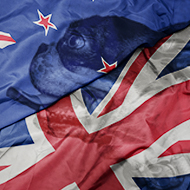Kennel Club announces collaboration with Dogs New Zealand

The organisations have agreed to operate the Respiratory Function Grading Scheme which assesses dogs for for BOAS.
The Kennel Club has announced a collaboration with Dogs New Zealand (The New Zealand Kennel Club) to improve and protect the health of brachycephalic dog breeds.
The organisations have agreed to operate, under licence, the Kennel Club/University of Cambridge's Respiratory Function Grading (RFG) Scheme, which assesses bulldogs, French bulldogs and pugs for Brachycephalic Obstructive Airway Syndrome (BOAS).
“We are delighted to work with Dogs New Zealand to help improve brachycephalic health and make a difference for dogs,” commented Tony Allcock OBE, executive chairman at the Kennel Club. “The Respiratory Function Grading Scheme enables breeders and owners of Bulldogs, French Bulldogs and Pugs to make informed decisions and aims to create a healthier future for these breeds.
“This move also enables further and international data collection on those complex health conditions related to brachycephaly which is vital for ongoing research and developing evidence-based solutions.”
Dogs New Zealand president Mr Brian Harris said that adopting the RFG scheme was part of a scientific, evidence-based approach to help breeders to improve the health of pugs, bulldogs and French bulldogs in New Zealand.
“The RFG Scheme will be one of the compulsory health tests available for these three brachycephalic breeds should they adopt our Litter Registration Limitation (LRL) Health schemes,” said Mr Harris.
“In addition, the RFG Scheme will be immediately designated as a mandatory test for the three breeds under our Accredited Breeders Scheme. We look forward to all Pugs, Bulldogs and French Bulldogs in New Zealand having the opportunity to participate in this evidence-based scheme.”
Tony Allcock OBE added: “We encourage other Kennel Clubs across the world who are committed to improving the health of brachycephalic dogs globally to follow New Zealand’s lead and contact the Kennel Club’s health team. By working together we can make a difference for dogs and we look forward to collaborating with other Kennel Clubs and organisations internationally to license the Respiratory Function Grading Scheme.”



 The Animal and Plant Health Agency (APHA) has updated its online reporting service for dead wild birds.
The Animal and Plant Health Agency (APHA) has updated its online reporting service for dead wild birds.